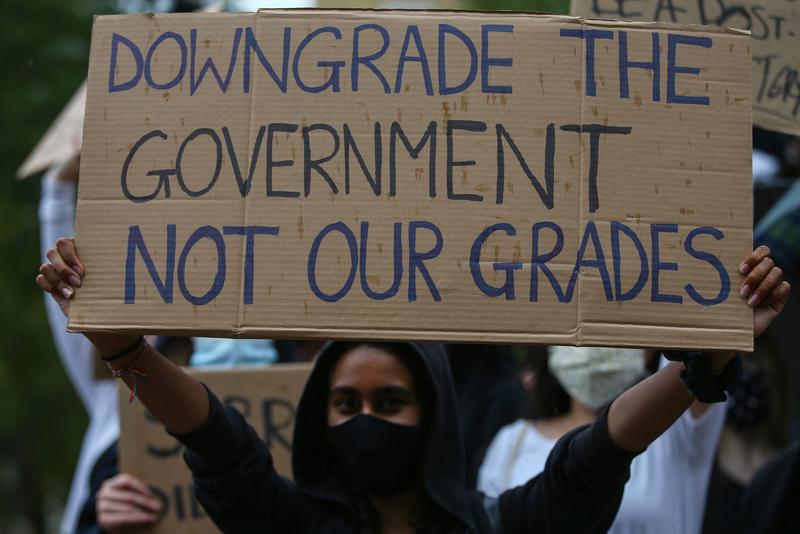 Students take part in an A-Level results protest opposite Downing Street on Aug 16, 2020 in London, England. (HOLLIE ADAMS / GETTY IMAGES / BLOOMBERG)
Students take part in an A-Level results protest opposite Downing Street on Aug 16, 2020 in London, England. (HOLLIE ADAMS / GETTY IMAGES / BLOOMBERG)
Boris Johnson’s government appears ready to bow to pressure to alter England’s exam grading system after parents and students reacted with fury to results announced last week.
Anger was immediate when the results for A-Level exams, which are sat at 18, were announced last week
The prime minister on Monday stood by his embattled Education Secretary Gavin Williamson, insisting he had full confidence in him. But his spokesman, Jamie Davies, said the government is still working on the system, suggesting that revisions to results announced last week could be imminent.
One Conservative member of Parliament said privately that they’d been told to expect an announcement from the government at 4 pm.
ALSO READ: UK encourages at-risk groups to sign up for virus vaccine trials
The row has come about because the coronavirus lockdown meant schoolchildren couldn’t sit their exams this year. Instead, the Department for Education asked the regulator, Ofqual, to find a way of giving children the grades they would have got. But the algorithm it devised has seen top students downgraded from the grades predicted by their teachers, and some children failed altogether if they go to a school that had poor results in the past.
To make matters worse, the structure of the algorithm meant it was less likely to hurt children in smaller classes, which benefited students at private schools.
U-turn demands
A growing number of Conservative MPs, including two ministers, have called for a government U-turn to base results on teachers’ predicted grades, rather than the algorithm.
“The whole of the government has been and continues to work hard to come up with the fairest system for pupils.” Davies told reporters Monday. “We recognize this has been an incredibly difficult year and that’s why we’ll continue to work to produce the fairest system possible.”
Anger was immediate when the results for A-Level exams, which are sat at 18, were announced last week. At first, the focus was on the brightest students, many of whom found their teachers’ predictions of their results had been downgraded by a notch, meaning they missed out on places at the universities they wanted. By Monday, there was outrage at the way students at the other end of the spectrum were told they’d failed simply because Ofqual judged that some students at their school would typically fail.
Johnson himself defended the system as “robust” and “dependable for employers” after 39 percent of resuilts were downgraded by the algorithm. But the government has already issued one hasty alteration to the system in the last seven days, after Williamson saw the difficulty that his Scottish counterpart, John Swinney, had got into with Scottish results, announced a week earlier.
Apology
Swinney last week apologized for the system he’d introduced, and said children would be graded on the basis of the grades their teachers had said they would get. That evening, Williamson announced a further route of appeal for English students, without giving detail about how it would work.
A further wave of problems is likely on Aug 20, when the results for GCSE exams, which children usually sit at the age of 16, are due. Johnson’s spokesman insisted those results would be announced as scheduled.
READ MORE: Recession leaves hard questions for UK
Adding to the pressure on the prime minister, the government of Northern Ireland said Monday its GCSE results would be given based on teacher assessment, rather than the algorithm. The BBC reported the Welsh government decided to do the same for A levels and GCSEs, as well as other school qualifications.


